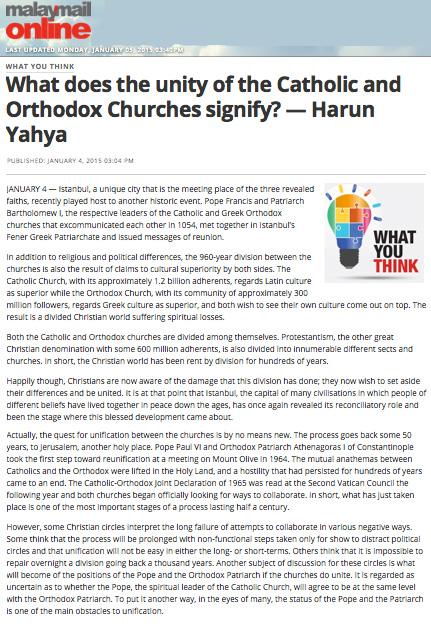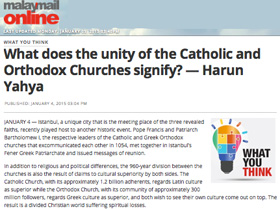
Istanbul, a unique city that is the meeting place of the three revealed faiths, recently played host to another historic event. Pope Francis and Patriarch Bartholomew I, the respective leaders of the Catholic and Greek Orthodox churches that excommunicated each other in 1054, met together in Istanbul’s Fener Greek Patriarchate and issued messages of reunion.
In addition to religious and political differences, the 960-year division between the churches is also the result of claims to cultural superiority by both sides. The Catholic Church, with its approximately 1.2 billion adherents, regards Latin culture as superior while the Orthodox Church, with its community of approximately 300 million followers, regards Greek culture as superior, and both wish to see their own culture come out on top. The result is a divided Christian world suffering spiritual losses.
Both the Catholic and Orthodox churches are divided among themselves. Protestantism, the other great Christian denomination with some 600 million adherents, is also divided into innumerable different sects and churches. In short, the Christian world has been rent by division for hundreds of years.
Happily though, Christians are now aware of the damage that this division has done; they now wish to set aside their differences and be united. It is at that point that Istanbul, the capital of many civilisations in which people of different beliefs have lived together in peace down the ages, has once again revealed its reconciliatory role and been the stage where this blessed development came about.
Actually, the quest for unification between the churches is by no means new. The process goes back some 50 years, to Jerusalem, another holy place. Pope Paul VI and Orthodox Patriarch Athenagoras I of Constantinople took the first step toward reunification at a meeting on Mount Olive in 1964. The mutual anathemas between Catholics and the Orthodox were lifted in the Holy Land, and a hostility that had persisted for hundreds of years came to an end. The Catholic-Orthodox Joint Declaration of 1965 was read at the Second Vatican Council the following year and both churches began officially looking for ways to collaborate. In short, what has just taken place is one of the most important stages of a process lasting half a century.
However, some Christian circles interpret the long failure of attempts to collaborate in various negative ways. Some think that the process will be prolonged with non-functional steps taken only for show to distract political circles and that unification will not be easy in either the long- or short-terms. Others think that it is impossible to repair overnight a division going back a thousand years. Another subject of discussion for these circles is what will become of the positions of the Pope and the Orthodox Patriarch if the churches do unite. It is regarded as uncertain as to whether the Pope, the spiritual leader of the Catholic Church, will agree to be at the same level with the Orthodox Patriarch. To put it another way, in the eyes of many, the status of the Pope and the Patriarch is one of the main obstacles to unification.
The right and proper thing to do is without doubt to set all these concerns aside and look at developments from a positive perspective. The Pope’s visit to Istanbul clearly revealed that the Catholic Church does not regard itself as superior to other churches. Moreover, the way that Pope Francis and Patriarch Bartholomew lovingly embraced one another before the eyes of the world, the way that Patriarch Bartholomew kissed the forehead of the Pope as he bowed before him, and the way they issued warm messages of unification strengthened the idea that there is a genuine search for unity going on between them.
The Pope’s words during the General Audience at St Peter’s Square on May 28, 2014, following his trip to the Holy Land supported this idea: “We all felt the bitterness and suffering of the divisions that continue to exist between Christ’s disciples, and this has really done great harm, harm to the heart. We are all brothers in Christ, and with the Patriarch Bartholomew we are friends, brothers; we have shared the desire to walk together, to do what we are able to do today: To pray together, to work together for God’s flock, to seek peace and protect creation, the many things that we have in common.”
There is no doubt that this is what will be pleasing to God. Indeed, as in the other Holy Scriptures, the main themes in the Christian Holy Book are peace, love and brotherhood. The Gospels say nothing in favour of hatred, anger and division, and the entire New Testament encourages peace, brotherhood, mutual love, respect and solidarity. The Gospels are intended to bring love to all mankind. Therefore, the duty of Pope Francis, Patriarch Bartholomew and all Christians is to accelerate as much as possible all developments that can open the way to peace and to set out a powerful idea of love that will eliminate the distance caused by almost a thousand years of division.
We, as Muslims, are responsible for wanting all Christians — and Jews — who love God to be friends with each other just as we want to put an end to all conflicts among all our Muslim brothers in the world and bring unity to the world as soon as possible. Hence, establishing bonds of love among Muslims, Christians and Jews will be an auspicious development that would bring a warm and spiritual atmosphere to the whole world.
The duty of all those who love and fear God is to bring about peace on earth and to be among the defenders of peace. Consequently, all Christian groups who desire peace should therefore put an end to the historic disagreements among them and the divisions created by prejudices and other reasons, embrace one another with love, friendship and brotherhood and be united. Furthermore, they should also lead the way for all believers to live hand-in-hand and strive to bring peace to the world. They should also be full of love for Muslims and Jews, in the same way that they are for one another, and must make it clear that they regard them as friends and brothers. They should bear in mind the great and urgent need for world peace and bring about the process of unification without further loss of time. That is the virtuous behaviour that will please God the most and that is most compatible with the essence of faith, ethics and reason.
Adnan Oktar's piece on The Malay Mail:


